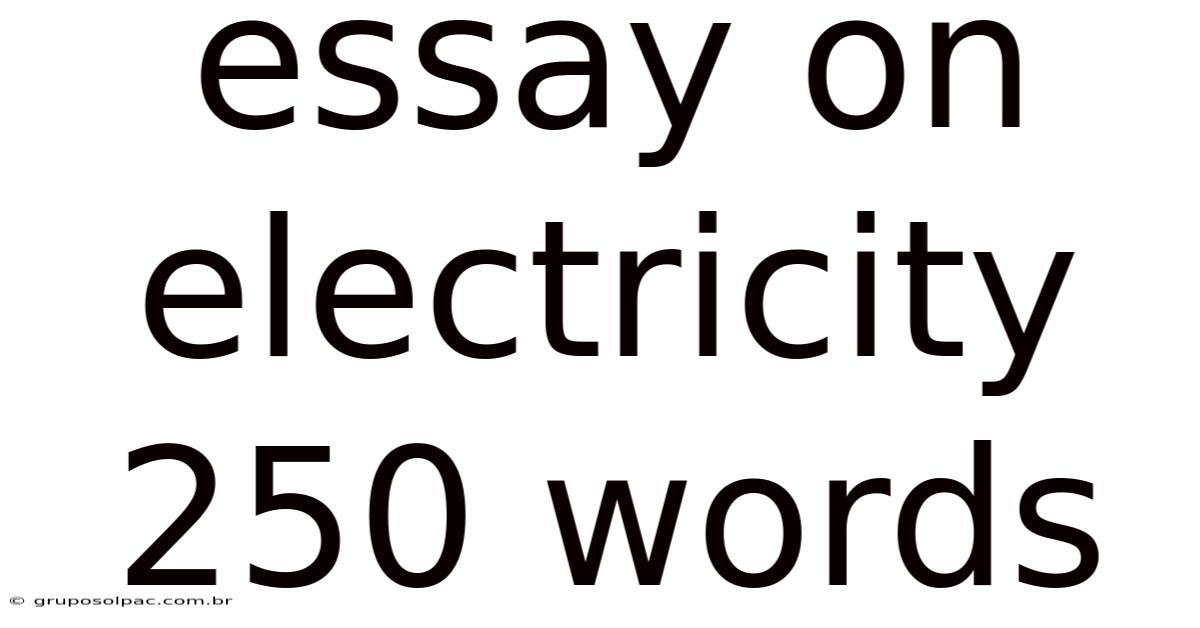Essay On Electricity 250 Words
gruposolpac
Sep 14, 2025 · 4 min read

Table of Contents
Essay on Electricity: Powering Our Modern World (250+ words)
Electricity, an invisible force, underpins the fabric of our modern world. From the simplest light bulb to the most complex supercomputers, its presence is ubiquitous, shaping our lives in profound and often unseen ways. This essay will explore the nature of electricity, its generation, and its transformative impact on society.
Understanding Electricity: The Basics
At its core, electricity is the flow of electric charge. This charge, carried by electrons, moves through a conductor, such as a wire, creating an electric current. The movement of these electrons is driven by a potential difference, or voltage, between two points. This voltage creates an electric field, pushing the electrons along the conductor. The rate of flow of these electrons is measured in amperes (amps). The relationship between voltage, current, and resistance is described by Ohm's Law (V=IR), a fundamental principle in electrical engineering.
Generation and Sources of Electricity
Electricity generation relies on converting other forms of energy into electrical energy. Traditional methods include burning fossil fuels (coal, oil, and natural gas) in thermal power plants to heat water and create steam, which drives turbines connected to generators. These generators use electromagnetic induction to convert mechanical energy into electrical energy. Nuclear power plants utilize nuclear fission to generate heat, similarly driving turbines.
Renewables are increasingly important. Hydroelectric power harnesses the energy of flowing water, while wind turbines convert the kinetic energy of wind into electricity. Solar power converts sunlight directly into electricity using photovoltaic cells. Geothermal energy taps into the heat from the Earth's interior. Each source has its environmental implications, with renewables offering a more sustainable path towards energy independence.
The Impact of Electricity on Society
Electricity's impact is transformative. It revolutionized industries, powering factories and mass production. It brought light to homes and streets, extending the workday and improving safety. It enabled communication through the telegraph and telephone, and later, the internet. Electricity fuels transportation, powering electric trains and vehicles, and facilitates modern medicine through sophisticated equipment like X-ray machines and MRI scanners.
Challenges and the Future of Electricity
Despite its benefits, electricity generation and distribution present challenges. Fossil fuel reliance contributes to climate change, necessitating a transition towards renewable energy sources. Efficient energy storage remains a critical area of development to overcome the intermittency of renewables like solar and wind power. Ensuring equitable access to electricity globally is also a significant concern, with many regions still lacking reliable power.
The future of electricity hinges on innovation and sustainable practices. Smart grids, energy-efficient technologies, and advancements in battery storage are vital for creating a cleaner, more reliable, and accessible energy system. Further research into new renewable energy sources, such as fusion power, holds the promise of a sustainable energy future for generations to come. The ongoing quest for cleaner, more efficient, and universally accessible electricity is a crucial endeavor for the continued progress and well-being of humanity.
Further Exploration: Specific Applications of Electricity
The pervasiveness of electricity is further highlighted by its role in various specialized fields:
-
Medical Applications: From life-saving surgical tools to diagnostic imaging (X-rays, MRI, CT scans), electricity is integral to modern healthcare. Pacemakers and other implantable devices rely on electricity to regulate vital functions. Electrotherapy is used to treat various medical conditions.
-
Industrial Applications: Electricity powers heavy machinery in factories, enabling mass production of goods. It’s crucial for refining processes, material handling, and automation systems. The electric arc furnace is used in metallurgy to melt and refine metals.
-
Communication and Information Technology: The internet, smartphones, and computers all rely fundamentally on electricity. Data transmission, signal processing, and computation are all powered by electrical currents. The development of microelectronics has miniaturized these applications significantly.
-
Transportation: Electric vehicles (EVs) are gaining popularity as a sustainable alternative to gasoline-powered cars. Electric trains and trams offer efficient mass transit solutions. Aircraft are increasingly incorporating electric systems for flight control and auxiliary power.
Conclusion: Electricity – A Fundamental Resource
In conclusion, electricity is more than just a utility; it's a foundational element of our modern civilization. Its generation, distribution, and application are complex processes demanding continuous innovation and responsible management. Addressing the challenges associated with its production and ensuring equitable access are crucial for building a sustainable and prosperous future for all. Further exploration of its applications and the development of new energy technologies will continue to shape our world in profound ways. The story of electricity is far from over; it is a continuing narrative of progress, innovation, and the pursuit of a brighter future.
Latest Posts
Latest Posts
-
Paragraph On Conservation Of Trees
Sep 14, 2025
-
What Are Identifiers In Python
Sep 14, 2025
-
What Are Resources Class 8
Sep 14, 2025
-
Write An Essay On Patriotism
Sep 14, 2025
-
Importance Of Trees 100 Words
Sep 14, 2025
Related Post
Thank you for visiting our website which covers about Essay On Electricity 250 Words . We hope the information provided has been useful to you. Feel free to contact us if you have any questions or need further assistance. See you next time and don't miss to bookmark.